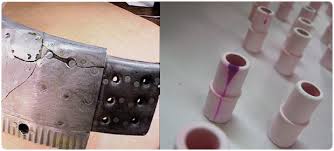Introduction
This training course will provide an integrated practical overview of metals and alloys and relating it to the mechanical and physical characteristics of metals; starting from materials testing and physical/mechanical properties, through corrosion properties and strength/deformation principals, and to ferrous and non ferrous alloys and heat treatment.
The course will then include ferrous alloys (plain and alloy steels, Stainless steels and cast irons) and non ferrous alloys (for corrosion and high temperature applications, such as nickel, cobalt and titanium based alloys).
The nature of hot and cold working of metals and heat treatment, including annealing, normalising, tempering and case hardening will be explained.
The fundamentals of corrosion and corrosion prevention will also be presented in practical terms with examples to illustrate the key points.
The behaviour of metals under various loading conditions (static, dynamic, fracture) will be presented and related to design methodology and procedures; rules of thumb, standards, and best industry practices.
Each of the major topics will be presented as individual units, and in the context of the overall usage of metal components and structures and failure mechanisms, and mechanical integrity.
Objectives
Upon completion of this course, participants will have gained an understanding of the important principals of engineering involving properties and characteristics of metals and alloys, including fabrication and heat treatment of commercial steels and non-ferrous alloys.
Participants will acquire sufficient knowledge and skills to independently evaluate possible metallurgical and design solutions, to recognise crucial metallurgical phenomena and intelligently discuss their metal problems with design engineers, metallurgists and fabricators.
Training Methodology
The course combines presentations and discussions of topics covered with relevant examples. It combines knowledge of fundamental principles related to the structure of metals sound engineering principles, methods, and applicable standards and best industry practices and enforces learning with Question & Answer sessions to maximize the benefits to the participants.
Videos of relative manufacturing processes of metals will also be included.
Participants will be provided with comprehensive course notes and copies of presentation material that will be very valuable for detailed study and future reference.
Organizational Impact
- The company will be able to specify and select metallic components and other components that are fit-for-purpose without excessive design margins leading to cost effective facilities
- The company will be able to achieve measurable improvement in mechanical integrity of metal structures and other equipment through effective interaction between various engineering disciplines, operation and maintenance functions
- Furthermore, an improvement in basic inspection and maintenance may be achieved
- This will also lead to improvement in operating and financial performance, and lead to improvement in loss prevention and safety performance
Personal Impact
- Upon completion of this course, participants will have gained an understanding of the important principals of metallurgy, involving properties and characteristics of metals and alloys
- Participants will increase their basic knowledge in related topics such as fabrication and heat treatment of commercial steels alloys
- Participants will acquire sufficient knowledge and skills to independently evaluate possible metallurgical and design solutions, to recognise crucial metallurgical selection/design/treatment and intelligently discuss their metal problems with design engineers, metallurgists and fabricators
- Participant will enhance their knowledge, regarding failure mechanisms, including corrosion
- Participants will enhance their competence and productivity thereby improving their performance level and making additional value added contributions to their organizations
Who Should Attend?
This seminar is intended for those who use or supervise activities requiring the use of metal parts or structures. Those with little or no prior formal background who function as:
- Supervisors
- Engineers
- Planners
- Inspectors
- Designers
- Researchers
- Investors
And who seek a basic understanding of the practical aspects of metallurgy should find this course valuable.
SEMINAR OUTLINE
DAY 1
Testing and Mechanical Properties of Metals
- Tensile tests
- Impact tests
- Hardness tests
- Compression of mechanical properties
The Crystalline Structure of Metals
- Bonding in metals
- Solidification crystal growth and structures of metals
- Defects in metals during solidification
DAY 2
Specimen Preparation and Microscopic Examination
- The preparation (Mounting Grinding, Polishing and Etching) of metal specimens
- Metallurgical and Electron Microscopes
Dislocations and Strengthening Mechanisms in Metals
- Edge Dislocation (line imperfections) in crystals
- Strengthening of metals by Grain Size Reduction, Solid Solution and Strain Hardening
- Softening of metals by annealing
- Comparison of Cold and Hot working of Metals
DAY 3
Binary Equilibrium Diagrams
- Solubility and cooling curves
- Thermal Equilibrium Diagrams (Eutectic Type, Solid Solution Type and Combination Type)
Ferrous Alloys
Definitions and classifications and some uses of ferrous alloys including:
- Carbon steels
- Alloy steels
- Stainless steels
- Cast irons
Fabrication of Metals
A selection of metal fabrication methods, including:
DAY 4
Heat Treatment of Plain Carbon Steel
- Hardening of carbon steel (by quenching)
- Annealing
- Normalising
- Tempering
- Austempering
- Surface treatments
- Heat affected zone (HAZ) in welding
Non-Ferrous Alloys
- Nickel and cobalt
- Titanium alloys
DAY 5
Corrosion in Metals
- The electrochemical cell
- Types of electrochemical corrosion
- Pitting
- Crevice
- Stress corrosion
- Hydrogen induced, etc.
Protection Against Electrochemical Corrosion and Inspection
- Coatings
- Internal
- External
- Polymers
- Galvanizing, etc.
- Inhibitors, Types and usage
- Cathodic protection, Impressed current, Sacrificial
- Inspection
- Standards

